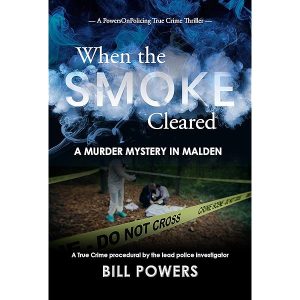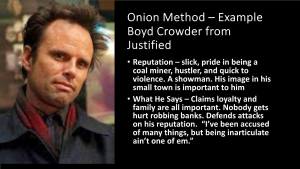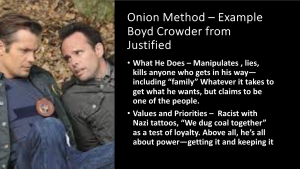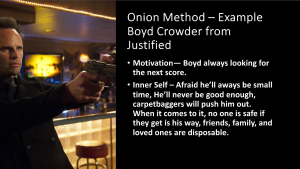Winter 2023-2024 Edition
News From the Top
President’s Message
 The holiday season is upon us, the end of 2023 is near, and I wish you all a happy, healthy, and prosperous 2024!
The holiday season is upon us, the end of 2023 is near, and I wish you all a happy, healthy, and prosperous 2024!
2023 was one of our best as a writer’s organization. The conference was excellent, attendance was up, new, talented writers became award winning authors, and a good time was had by all. I can hardly wait for next year!
I urge all our members to take an active role in increasing our membership. Tell all your writer friends about us, post comments on your writer group(s) social media, talk us up at personal appearances and book signings, praise the conference, etc. After all, the most effective way to attract new members is through word-of-mouth.
The talents of our members are so impressive! I enjoy reading about your writing accomplishments and new book releases. I also am impressed by our listserv discussions, and appreciate the willingness of our group members to provide sage advice. So, don’t be shy in seeking help! It doesn’t matter how much or how little you’ve written; we all need good advice at some point. Don’t forget to make use of the PSWA website. It will help you get to know the organization and its members, and please contribute your announcements and news of your accomplishments to our Facebook page and listserv.
I have enjoyed every minute as PSWA president and the chance to contribute to the organization’s welfare and its future. I consider this role an honor; at the top of the list of my life’s accomplishments. I will officially turn over the reins to a new president at the July 2024 Conference. (An announcement will be forthcoming when the new president has been selected.) The PSWA has afforded me the opportunity to meet many wonderful writers, make life-long friends, and read an astonishing number of really great books. Even after my resignation becomes official, I assure you I will continue to be an active PSWA member and will look forward to seeing each of you at our yearly conferences.
One last reminder: your membership renewal is due in January (see the Treasurer’s Report), and you can use the renewal form posted on our website, available now.
Best wishes to for good health, happiness, and much success. See you in Las Vegas in July 2024!
John Schembra, President
Treasurer’s Report
 It’s hard to believe 2023 is nearly over. By the time you are reading this article, Thanksgiving will be behind us and the December holidays upon us. I love this time of year! Living in the desert during the holidays is unique. We don’t have pine trees in the desert valley, but we do have palm trees and saguaro cactus (the ones with the arms). A little-known fact is that it takes 75 years for the first arm to begin to grow. In Tucson, every cactus and palm tree is decorated from Thanksgiving weekend to about a week after New Year’s Day. We have more holiday decorations in the desert than I remember from when I was growing up in the northeast. Not only do people overcompensate for the lack of snow, but they also compete with their neighbors. One neighborhood, Winter Haven, even requires residents to participate in the holiday decorations. The electric company comes in with cherry-pickers to help hang the lights. The neighborhood has nights for the public to walk around and enjoy the decorations. I haven’t gone in years, but it was always fun. In my neighborhood, the guy down the street adds more decorations to his menagerie each year, and last year he played holiday music every evening while his lights blinked away. Occasionally we do see snow in January. The desert is beautiful when blanketed in white, which lasts about two hours!
It’s hard to believe 2023 is nearly over. By the time you are reading this article, Thanksgiving will be behind us and the December holidays upon us. I love this time of year! Living in the desert during the holidays is unique. We don’t have pine trees in the desert valley, but we do have palm trees and saguaro cactus (the ones with the arms). A little-known fact is that it takes 75 years for the first arm to begin to grow. In Tucson, every cactus and palm tree is decorated from Thanksgiving weekend to about a week after New Year’s Day. We have more holiday decorations in the desert than I remember from when I was growing up in the northeast. Not only do people overcompensate for the lack of snow, but they also compete with their neighbors. One neighborhood, Winter Haven, even requires residents to participate in the holiday decorations. The electric company comes in with cherry-pickers to help hang the lights. The neighborhood has nights for the public to walk around and enjoy the decorations. I haven’t gone in years, but it was always fun. In my neighborhood, the guy down the street adds more decorations to his menagerie each year, and last year he played holiday music every evening while his lights blinked away. Occasionally we do see snow in January. The desert is beautiful when blanketed in white, which lasts about two hours!
Our annual membership fees are due in January 2024. They are $65 per individual and $250 for a corporate membership. With the corporate membership, you are mentioned in each newsletter for the year. Also, you receive a quarter-page advertisement in the conference program.
Note that registration for the 2024 Conference—Notorious Nineteen—is open as well.
I want to wish everyone safe and happy holidays.
Kelli Peacock, Treasurer
Writing Competition Coordinator’s Report
 Where did the year go? Christmas is around the corner, and on January 1st , the PSWA Writing Competition will be open for 2024 entries!
Where did the year go? Christmas is around the corner, and on January 1st , the PSWA Writing Competition will be open for 2024 entries!
As I reported in the last newsletter, the board has agreed to some changes to the competition that will make it even better. The biggest change is in the way published fiction books will be judged. Entered books will be competing against books in the same subgenre: police procedurals competing against police procedurals, thrillers against thrillers, suspense against suspense….etc. You may have noticed that recently the UK’s Crime Writers Association expanded its awards program categories similarly.
The competition categories will be Police Procedurals, Thrillers, Suspense (including paranormal and romantic), Mystery ( including cozies) and a single category that will include Science Fiction, Fantasy, Young Adult, Middle Grade and Children’s writing. There will be a judge for each category. The entry form will let you indicate which category best fits your book and, of course, all entries must include some form of public safety. As last year, the Marilyn Meredith Award for Excellence will be given to one published fiction book and one published non-fiction book that received the highest scores from the judges.
In addition, we’ve added a Micro-writing category for works 25-40,000 words in length. Collections of short stories, essays, and articles by a single author are also eligible for awards.
In 2024, the writing competition section of our website will include two new forms to be completed online. One will be submitted to me, and, if the entry is for a non-published book, the manuscript must be attached. (This will simplify sending entries to the judges—saving both time and money!) The other form records your entry fee and goes to our treasurer, Kelli Peacock, just as your membership dues and conference registration fee do. This streamlining will help us keep the writing competition fees at their current low rate: $20.00 for an author’s first entry and $10.00 for each additional entry.
The new forms will be up on the website soon. Questions? feel free to email me at barbaramaehodges@gmail.com. There may be a few hiccups this first year, but we know we can make it work! Good luck, and I look forward to reading your entries.
Barbara M. Hodges, PSWA Writing Competition Coordinator
Conference Program Chairman
Notorious Nineteen Has Launched!
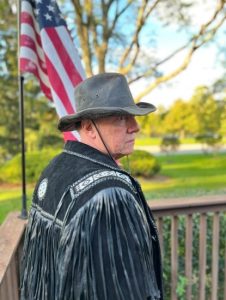 Rest assured the board is conscientiously working on our next PSWA Conference, which will take place July 11th through 14th at The Orleans Hotel & Casino in Las Vegas, Nevada. We’ve lined up some fabulous solo presenters for next year. Here’s a preview:
Rest assured the board is conscientiously working on our next PSWA Conference, which will take place July 11th through 14th at The Orleans Hotel & Casino in Las Vegas, Nevada. We’ve lined up some fabulous solo presenters for next year. Here’s a preview:
Paul Bishop
Renowned author, screenwriter, acquisitions editor, and legendary LAPD detective Paul Bishop will talk to us about interrogations. Paul spent 35 years in LAPD and was named Detective of the Year numerous times. He’s also a fabulous writer. His novels include the Fey Croaker series and the award-winning Lie Catchers. He’ll also represent Wolfpack Press at the publisher’s panel and give advice on pitches. You won’t want to miss The Art of Interrogation!
Gloria Casale and Janet Gregor
Two of our stalwart members, Janet Gregor and Gloria Casale will be talking about one of their favorite topics: doing somebody in via poison, and how deadly ones can even be found in your backyard. Gloria and Janet are well versed on this particular topic, and have frequently helped me and numerous other PSWA members with our research. Their presentation is guaranteed to make you think twice before taking your next bite of that meal your sweetie has prepared for you! Listen closely as they give the lowdown in Poisons and Other Nefarious Ways to Kill.
Colin Conway and Frank Scalise
Another pair of conference regulars, award winning authors Colin Conway and Frank Scalise, (who writes under the name Frank Zafiro),will do a tag-team presentation on writing with a partner. They’ve collaborated on both novels and several short story anthologies. These two ex-copper writers will tell you what it’s like to work in a creative collaboration—the ups and the downs. It’s rumored they’ll be using a timer to ensure neither one hogs the mic in Writing with a Partner—Are Two Heads Better Than One?
Scott Decker
This year we’ll be welcoming back one of our long-time PSWA members, retired FBI agent and award-winning author R. Scott Decker. Scott will discuss copyrights, infringement, and legal measures to ensure your rights. He speaks from personal experience, having recently been party to a protracted legal case involving copyright violation, when a major entertainment studio’s cable TV show illegally used sections of his book, Recounting the Anthrax Attacks: Terror, the Amerithrax Task Force and Evolution of Forensics in the FBI. Find out what you need to know to protect yourself and your work in The Ins and Outs of Copyright Infringement.
And Everything Else
Yes, we’re planning some great panels on a variety of topics, plus, the pre-conference workshop (July 11th, 9 to 3) not only offers great tips on writing, but also includes a one-on-one critique of up to 30 pages of your manuscript. The workshop costs an additional $45, but is well worth it—cheap at twice the price!
Saturday night we’ll have the Writing Competition awards ceremony, complete with wonderful food, so get your submissions in before the deadline and bring your appetite to the ceremony. Our Writing Competition has become one of the most prestigious awards in mystery writing, and this year there are more categories, so look for the submission forms on our website in January.
The Conference registration form is posted on the website and the special early bird price is now in effect. Take advantage of it today. See you in Vegas!
Michael A. Black, Conference Program Chairman
Member News
Corporate Sponsors
At present, three PSWA members have chosen to be Corporate Sponsors (see Treasurer’s Report). They are Mike Black, Steve Ditmars, and Rick Baron. A few words about each of these stalwart members.
Michael A. Black is the award-winning author of 48 books, mostly in the mystery and thriller genres, under his own name and several pen names. A retired Chicago police officer, Mike has done every job from patrol to investigating homicides to conducting SWAT operations and was awarded the Cook County Medal of Merit in 2010. He is the author of more than 100 short stories and articles, and wrote two novels with television star Richard Belzer (star of Law & Order SVU). His novel, Fatal Prescription, won the Scribe Award for Best Original Novel in 2018. His latest novels are Chimes at Midnight and entries in the ongoing Trackdown series. The eighth featuring ex-Army Ranger Steve Wolf, is Devil’s Lair, published in September. He is especially proud that the prestigious Alfred Hitchcock’s Mystery Magazine featured his latest short story, “Waiting for Godot,” on its cover.
SL Ditmars is the award-winning author of the Big Dogs series of police procedurals involving police officers and their K9 partners. He is a 28-year veteran of the Long Beach, Calif., Police Department, where he held positions in patrol, police K9, information technology, homeland security, counterterrorism, and police communications. He currently resides in Prescott, Ariz., with his wife and their German shepherd rescue dog, Gunnar.
Rick Barton is the Chief Executive Officer of ICISF (International Critical Incident Stress Foundation, Inc.), an organization to aid first responders and others who have been involved in critical incidents to ameliorate any emotional or physical after-effects. Based in Maryland, ICISF works with public safety and other agencies across the United States and internationally.
Short Takes
Earlier this month, Frank Scalise alerted members that the Rippollsworkshop Reads podcast is open to approaches from authors who’d like to be interviewed in their podcast series. You can hear a sample of their work in this interview with Frank. Although there’s a long lead time with this outlet and any single podcast or guest web post may not translate directly to sales, he says, “they do provide an evergreen piece of marketing.” Nice tip!
Member Bill Powers also interviewed Frank for his podcast Powers on Policing, an episode primarily focused on the current state of policing in America and “the somewhat desperate need to rebuild trust between the community and the police.” Check out Bill’s nice-looking website, which includes his podcasts, books, and more. Meanwhile Bill himself was an interesting guest on member Sally Handley’s recent Meet the Author podcast, discussing his career and his non-fiction book, When the Smoke Cleared. It’s a great interview, and you can hear it here.
Some Kind of Hell (Sandy Banks Thriller #2) is scheduled for publication December 12. Says author Frank Zafiro (he’s been busy! Read his article below and find out why!), in this book, vigilante assassin Sandy Banks is on the run, pursued by the FBI and his own demons from the past.
PSWA member Ann Parker received a top (gold) Will Rogers Medallion Award in the Western Mystery category for her book The Secret in the Wall, eighth in her Silver Rush Mysteries series, published by Sourcebooks. The book also won a 2023 Spur Award and was a Historical Novel Society Editor’s Pick. Woo-hoo!
Member Patrick Weill is looking for ARC readers for his book The Mazatlan Showdown, v.2.0. If you’re interested, for a limited time he can make a free copy available to you. According to Patrick, the original version was well received, but he’s completely rewritten it and, he says, it’s much better! But he’d like your opinion! If you’d like a copy, contact him at pbw@patrickweill.com.
Wrong Place, Write Crime in 2024 by Frank Zafiro
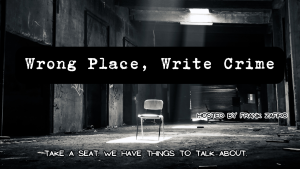 (PSWA 2024 Conference attendees—Read to the end for some important information!)
(PSWA 2024 Conference attendees—Read to the end for some important information!)
In 2017, I started my podcast, Wrong Place, Write Crime, to promote other authors—particularly other crime fiction authors. Over the course of 166 episodes, I did just that. Along the way, I interviewed brand new authors and established ones, had conversations with some of my friends (you know who you are!), made new ones (you also know who you are!), and talk to some authors I’ve long admired (not to name-drop, but… I will: Steve Hamilton, Christopher Moore, Dana Stabenow, Walter Mosely, and Eric Van Lustbader, just to name a few. Quite a thrill!).
It was a great gig, but it also took a lot of time and effort. I mean a lot. This was especially true when I transitioned from monthly to weekly episodes. My own writing suffered. As any writer knows, this is a hard pill to swallow. So, as much as I loved the experience, after five years, I shut the podcast down while I still enjoyed it and before I started to resent the time it required. I put the show on hiatus, believing that probably would be the end.
I don’t regret making that choice, but I did miss the interaction with other authors and the opportunity to promote them. But everything in life is a tradeoff. Ironically, it was my own work (sort of), that brought the show out of hiatus. After 15 months of a silent mic, I did a 12-episode mini-series to celebrate the end of my novella anthology series, A Grifter’s Song. Its 35 installments featured 30 authors. I created the series, acted as editor, and wrote multiple episodes. As it came to an end on October 1, 2023, with the release of the final episode, Into the Dying Sun, I reactivated the podcast to interview all of the involved authors about their specific episode. And it was fun.
I realized I’m not ready to let the show’s hiatus turn into an ending, after all. But the conundrum remains—how to balance hosting a podcast with my own writing (and marketing, since as an indie author, all of that is my responsibility). There has to be a happy medium, doesn’t there?
Ultimately, I landed on a new format for 2024 and beyond, which will involve producing about six episodes a year. I’ll do two, maybe three long-form interviews with a single author. That will give me the opportunity to meet and talk with more of my “dream” interview subjects (Stephen King, I haven’t given up yet!). The remaining episodes are what I’m dubbing my “conference episodes.” For the last couple of years, my conference circuit has been Left Coast Crime, Bouchercon, and the PSWA conference. At each of these, I intend to record short (3 to 5-minute) interviews with as many authors as are willing to talk to me, which I’ll compile into an episode exclusively from that particular conference. This will give me the chance to meet, talk with, and promote a large number of authors each year, but involve far less production time than weekly podcasts.
I hope this new format will be the happy medium I’m looking for: quality podcasts that promote my fellow writers without negatively impacting my own writing output. I’m committed to trying out this approach for 2024, so even if I’m wrong, there’ll be another year of Wrong Place, Write Crime.
If you’ll be at the 2024 PSWA Conference and would like to be part of that episode, get with me during the conference and we’ll record!
Holiday Stories from Our Members
 If you have any back issues of various mystery magazines lying around, you just might find one of these festive tales!
If you have any back issues of various mystery magazines lying around, you just might find one of these festive tales!
“Miracle on a Train” by Violet Moore, published in Christmas Miracles, an anthology by Cecil Murphy and Marley Gibson, published by St. Martin’s Press.
The book Sniffing Out Scandal by Leanne Baker (aka Thonie Hevron), a cozy Christmastime mystery published by CKN Christian Publishing.
And your editor, Vicki Weisfeld, has a couple herself:
“Hungarian Christmas,” published in Mystery Magazine (12/21), a young couple saved by the Jersey City P.D. (O’Neil De Noux is also in that issue and possibly other PSWA members.)
In “A Slaying Song Tonight,” published in Ellery Queen Mystery Magazine (Jan/Feb 2017), flashing red and blue lights on the hillside aren’t bringing glad tidings to the town’s carolers.
The Writing Craft: Upping Your Game
Capturing the Criminal Character by James L’Etoile
Creating a complex and engaging character is what I enjoy most when drafting a new story. For me, character is the single most important thing, and I’ll spend weeks figuring out who the characters are before I put a word on paper. I want to know not just their accomplishments and fears, but what they truly want, and how far they are willing to go to get it.
I’ve found that readers (and television streamers) crave characters they care about. Readers are smart, and once they are engaged in a well-developed character’s journey, they will overlook a plot hole, or forgive a convoluted story. If your people on the page don’t resonate with readers, if they seem flat and uninteresting, reviewers and critics will shame you, and readers will toss your book aside.
There are dozens of methods and models to help authors figure out who their characters are and what drives them. I recently taught sessions at Killer Nashville and for the SE chapter of Mystery Writers of America on “Capturing the Criminal Character.” In crime fiction, solid, believable criminals are essential. Too many authors portray the criminal subculture through stereotypes. Their criminals are evil, one-dimensional, with no redeeming qualities. However, for audiences today, the traditional villain (and hero) roles are too narrow. Especially if you’re writing a noir or thriller, the protagonist in your story might be one of those shady characters. With so much “story” riding on him (or her), characterization calls for complexity!
Think of some of your favorite literary and film criminals. All of them are the “heroes” in their own stories. One of the best examples is an Elmore Leonard character—Boyd Crowder from Justified. What’s in Boyd’s make up? In sociological terms, we talk about criminogenic needs which are associated with low self-control, anti-social personality, anti-social values, criminal peers, substance abuse and dysfunctional family.
Each of these factors influences how Boyd interacts with other people and how he responds to an obstacle or a threat. Thinking about these factors helps flesh out a character and suggests how you, the author, might get them on the page. How you layer in all the criminogenic needs can make or break your manuscript. And do it artfully, not all at once.
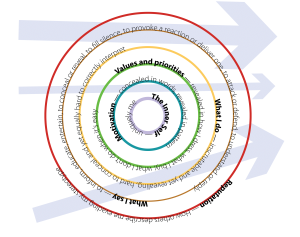 A visual model I find helpful is UK author Martin Turner’s Onion Model (at left), which illustrates how we identify all the flotsam and jetsam that make up a character. Using it, we can feather in the right amount of detail in a particular scene. The circles, or layers of the onion, represent the traits, habits, and belief systems that make up our characters from the most superficial on the outside (reputation) to their innermost fundamental beliefs:
A visual model I find helpful is UK author Martin Turner’s Onion Model (at left), which illustrates how we identify all the flotsam and jetsam that make up a character. Using it, we can feather in the right amount of detail in a particular scene. The circles, or layers of the onion, represent the traits, habits, and belief systems that make up our characters from the most superficial on the outside (reputation) to their innermost fundamental beliefs:
Reputation—How others describe them
What They Say—To inform, educate, entertain, conceal, or reveal
What They Do—Inscrutable and yet revealing, hard to conceal, and hard to correctly interpret
Values and Priorities—Revealed in how they dress, what they buy, what they don’t do when it’s easy
Motivation—Concealed in words, revealed in pattern
The Inner Self—Uniquely them
Let’s look at what the Onion Model might reveal about Justified’s Boyd Crowder (apologies that it’s blurry):
My pre-work on working out a character’s details pays off when I start writing my draft. I know how the character thinks, acts, and reacts, so there are fewer instances of writing myself into a corner, or massive revisions to “beef up” a flat character. This is just one way to think about that all-important job of developing characters, and it works for me. Find the one best suited to your writing style!
James L’Etoile uses his 29 years behind bars as an influence in his award-winning novels, short stories, and screenplays. He is a former associate warden in a maximum-security prison, a hostage negotiator, and director of California’s state parole system. His novels have been shortlisted or awarded the Lefty, Anthony, Silver Falchion, and the Public Safety Writers Association Award. Face of Greed is his most recent novel. Look for Served Cold and River of Lies, coming in 2024. Find out more at www.jamesletoile.com.
Writing Books People Actually Read
Fans of award-winning thriller writer George Galdorisi’s rebooted Tom Clancy books may be glad to see his new book offering practical advice to aspiring writers: Braveship Writers Share Their Secrets: How to Write Books People Actually Read. Galdorisi is a career naval aviator, whose active duty service included four command tours and five years as a carrier strike group chief of staff. He’s now written 15 commercially published books.
Your editor recently published a list of some of the writing-advice books she’s found most helpful. They are:
A Swim in a Pond in the Rain by Booker Prize-winner George Saunders
On Writing by Stephen King (heard of him?)
The Emotional Craft of Fiction by Donald Maass, a real eye-opener for me
From Where You Dream by Pulitzer-winner Robert Olen Butler
The Art of Subtext: Beyond Plot by Charles Baxter
A few commenters on the blog post that included this list testily advised, “Just write the damn book!” and there’s a lot to be said for learning by doing. But also, for newer writers, a lot of avoidable mistakes can be made too. The post suggest that reading advice and writing should exist side-by-side, so that the advice isn’t abstract (you’re solving real story problems) and the writing is always on an upward path of improvement. On the off-chance it’s needed. (ha)
Publishing Tips and Travails
Generative AI and Authors
Most authors are aware of the turmoil around generative artificial intelligence and the lawsuits that various authors and organizations representing them (such as the Authors Guild, whose case focuses on fiction) have filed in protest. You probably also know that generative AI has been trained on copyrighted materials. Research organization OpenAI contends that their training falls into the legally approved category of “fair use.” The company further contends that their net is so big, any particular publication is just a tiny fraction of the total. They’ve said their purpose isn’t to know “the content of any given story or any given novel,” but “the patterns in the output of collective human intelligence.” What’s the harm here? This statement from SFWA spells the issues out nicely, if you want to read further. (**Thanks to Jane Friedman’s The Hot Sheet for the AI deets.**)
Do you think people are over-reacting and that AI can never replace a “real author”? I asked ChatGPT to write me the opening paragraph of a story in the style of Raymond Chandler and got this (instantly, by the way):
The night was sultry, draped in the kind of darkness that clung to the city like a bad reputation. The air was thick with the acrid perfume of trouble, and the streets whispered secrets only the shadows knew. I stepped into the neon glow of the Blue Falcon, a joint where the drinks were as watered down as the alibis. The dame at the bar had trouble written all over her like graffiti on an alley wall, and she wore it like a badge of honor. Her eyes, a dangerous shade of emerald, locked onto mine like a pair of handcuffs ready to snap shut. In this town, trouble had a way of finding you, and tonight, it walked through the door wearing a cocktail dress and a smile that could charm a snake out of its skin.
OK, a bit over the top, but . . . So, how about Cormac McCarthy?
The night hung heavy over the desert, a shroud of darkness stitched with stars. The wind whispered through the twisted branches of mesquite, carrying with it the scent of dust and regret. In the distance, the faint glow of a neon sign flickered like a dying ember, casting long shadows on the lonely highway. Sheriff Sam Thornton stood alone on the edge of town, his eyes fixed on the horizon where the land met the sky in an endless expanse of emptiness. He had seen too much in this unforgiving landscape, where secrets were buried as deep as the bones of the forgotten. As he lit a cigarette and inhaled the bitter smoke, he knew that tonight would bring more than the usual troubles – a storm was brewing on the horizon, one that would wash away the sins of the past and leave a trail of blood in its wake.
OK, let’s hit the thriller genre. Here’s Tom Clancy:
The submarine slipped beneath the icy depths of the Barents Sea like a phantom, its black hull cutting through the frigid waters with lethal grace. Captain Mark Reynolds stood at the helm of the USS Vengeance, his eyes fixed on the sonar readings as they painted a picture of the unseen dangers below. The tension on the bridge was palpable, a symphony of hushed orders and the low hum of the vessel’s powerful engines. In the shadowy realm beneath the Arctic ice, geopolitical tensions simmered, and the Vengeance was the silent guardian of secrets that could reshape the balance of power. As the submarine descended into the abyss, Reynolds couldn’t shake the feeling that they were on the brink of something far greater than a routine mission. The world above might be unaware, but in the cold depths of the sea, a storm was brewing, and the Vengeance was at its heart.
I made about seven or eight of these requests–from Agatha Christie to Elmore Leonard–and after a while there was a kind of sameness about ChatGPT’s approach, but at least they met the critical test of an opening page that raises story questions and promises a big bang for the buck.
If ChatGPT can do that with Raymond Chandler, Cormac McCarthy, and Tom Clancy, can us poor PSWA members be far behind? If there is a sameness here, are readers likely to realize it or care? I want to believe there’s a crucial difference between machine-generated and human-generated stories, but can the average reader detect it?
Share your thoughts about all this, and I’ll do a roundup of member responses next time: Send them to pswanews@gmail.com.
AI and You
Is AI being trained on your books? If you haven’t checked this out yet, you might want to investigate the Atlantic article that lit a firestorm among authors. (If you don’t already subscribe, you can start a free trial.) Many AI platforms have used the Books3 database explored in this article for training. This database contains 183,000 books, downloaded from pirated sources (sounds to me like a tremendous copyright violation from the get-go!).
If the threats to authors’ intellectual property weren’t enough, there’s a a seemingly endless stream of new AI-enabled ways for non-writers to cash in.
If you like podcasts or, if like Frank and Sally, you have one, Spotify says it will use OpenAI to replicate podcasters’ voices and translate them into other languages. Cavolo! zut! ¡maldita sea!
Editing Checklist by Camille Minichino
 Report from the last century: My first novel, 75,000+ words, was done, ending with the bad guy in handcuffs. Only I wasn’t done; the final edit loomed. How would I know when that was complete? Editing might—but couldn’t—go on forever. I needed a plan. And here it is, developed over more than 30 novels and short stories. If you’re a debut author, this might help you establish your editing parameters. If you’re experienced, I’d love to hear about your plan!
Report from the last century: My first novel, 75,000+ words, was done, ending with the bad guy in handcuffs. Only I wasn’t done; the final edit loomed. How would I know when that was complete? Editing might—but couldn’t—go on forever. I needed a plan. And here it is, developed over more than 30 novels and short stories. If you’re a debut author, this might help you establish your editing parameters. If you’re experienced, I’d love to hear about your plan!
My first tip: don’t proof or edit for everything at the same time! What, you say? I have to read this thing over and over? Yes. But don’t panic; here’s a four-step map that will guide each reading.
Reading 1: the basics
– check grammar, punctuation, spelling
– use ellipses, italics, dashes sparingly if at all; make your point with words
– check for consistent POV, one per scene
– keep track of time: hours, days, years
– clearly delineate backstory or flashback from the story present
Reading 2: style
– change weak verbs: be, have, walk, look, go, turn, and the like
– eliminate –ing words and adverbs, ly words in particular; instead, use similes or stronger verbs (“strolled,” versus “walked casually,” e.g.)
– change passive voice (search for “it was” and “there is/are”)
– check for overwriting: “‘Stop!’ she shouted loudly.”- trim useless words: just, only, really, very; stood UP, knelt DOWN
– one exclamation point per chapter, at most!
Reading 3: deeper
– for dialogue: add subtext
– add figures of speech, as needed
– change nonspecific words: several, many; use “BLT” instead of “lunch,” e.g.
– use 5 elements in a scene: action, dialog, description; internal thoughts; physiological reactions
– use all 5 senses in a scene
Reading 4: deepest
– use objective correlatives: objects, images, phrases that reappear and tie the story together
– pacing: read aloud for rhythm, variety of sentences, believability of dialog, and chapter lengths
– enlist and consider beta reader advice
Now you’re done. Let it go! Note that some authors use this plan in reverse, starting with the more literary steps and ending with punctuation. Either way, covering all four steps holds the promise of a clean, well-crafted manuscript, ready for submission.
Publishing and Promotion Miscellany
Publish with KDP? If you use Kindle Direct Publishing to produce your books, you will want to know it recently changed the policies regarding your release date options. You can release your book immediately, schedule a release of the print book (only) and set up a pre-order (eBooks only). Details here.
Another Amazon tool is the “embed” feature that allows potential readers to see the first few pages of your book—not just on your Amazon sales page, but wherever you want them to see it. This could be on your website and in book reviews for starters. The embed code includes “buy” and “preview buttons.” This article from the BuildBookBuzz website mentions that it works great on WordPress sites, and I can attest to that. I followed the directions and, amazingly, it worked! It took mere seconds to do.
WayWord Books is a new subscription-based publisher that sells print editions direct to readers and pays authors higher royalties than most traditional deals. The service’s first title will launch in December. Although “at present” they say they are not open to genre fiction, they are open to submissions of nonfiction and Mystery/Action Fiction. If you do a simple search for WayWord, you may not get to the correct site, but the link above works. Check it out.
Want some marketing advice for 2024? Or just want to make sure what you’re doing checks all the right boxes? This Copyblogger article looks better than most.
Is your book a victim of review bombing? You may have heard that on Goodreads, some books are hit with a barrage of negative reviews by people who have not actually read the books–sometimes, even before the book is released. Goodreads is taking the step to “temporarily limit submissions of ratings and reviews on a book during times of unusual activity.” Thanks to The Hot Sheet, November 8 edition, for this piece of good publishing-related news.
Botham Ghostwriters and the American Society of Journalists has established the Andy Awards to pay tribute to the ghostwriters and paid collaborators for nonfiction books. They’ve started with three categories of awards: business and thought leadership; memoir and narrative nonfiction (might be some public safety writers in there); and prescriptive nonfiction (here, too). The first set of awards will be announced in New York City in January. Here’s more.
Editor’s Turn
Kudos to Our Veterans
In case you missed it, in early November, The Wall Street Journal cited data showing a one-point lower unemployment rate for former service members (2.9%), compared to the overall U.S. rate. Apparently, employers value hiring military veterans because of their reputations for “hard work, humility and attention to detail.” Reporter Callum Borcher admits his research for the article wasn’t especially scientific, but he learned that ex-drill sergeants apparently do particularly well (I’m not sure how to react to that). Employers say vets come with little sense of entitlement and, despite facing a sometimes steep learning curve in the private sector, can handle constructive criticism.
If you have news or stories for our next newsletter, coming early March 2024, send them to tne Newsletter Editor, Vicki Weisfeld, pswanews@gmail.com. Thank you!
 Someone was really hedging their bets!
Someone was really hedging their bets!
“Wishing you a happy whatever doesn’t offend you” – a florist’s street sign in New Orleans, La., November 2022


